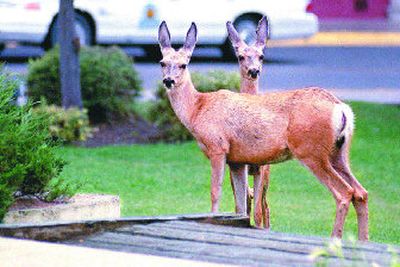Don’t take deer lightly

I need some ideas on fences that would keep deer out of my vegetable garden this year. I lost several crops to them last year. It would need to be wide enough for a four-wheel tractor. What about height and length between posts?
Warren McKinley, Spangle
Deer are very smart when it comes to getting around barriers. There are a number of deer repellants that can be sprayed on plants but the most effective barrier is a good fence. Deer can jump over six feet from a standing position so most fences I’ve seen are at least seven to eight feet tall. They can be made of any type of wire fencing that is easy for you to handle. The wire should be attached to sturdy posts probably eight to 10 feet apart as the deer will push on them to see if they give. The posts can be set to whatever width fits your tractor.
There is also an ultraviolet-stable polypropylene fence that comes in several widths up to seven and half feet and in 100 to 330-foot lengths. It is a two-inch square mesh that can be attached to posts or any other stable object. I have been using it since 2000 with only one problem; the little sneaks figured out how to crawl UNDER it last summer. Some sturdy cord run through the bottom of the fence and held to the ground with long stakes seems to have fixed the problem.
Eradicating Japanese clover
Last fall you wrote about eradicating horsetail weed. I thought you might have the answer to getting rid of the Japanese clover that has spread all through our lawn. Living on a ranch, we have access to chemicals but knowing the right thing to use is the problem. Also, we have a wiry weed that grows along the driveway. It’s small-leaved, gray-green in color with a long tough root and was blooming in mid-September. Any ideas?
Audrey Wagner, Reardan, Wash.
Japanese clover is a very tough weed to get rid of once it’s moved in. Triclopyr is the recommended chemical for a residential lawn application like yours. It is sold under several brand names. Part of the problem with Japanese clover is that it sends out lots of roots that anchor it tightly and deeply in the ground. Its small leaves don’t give much surface area for the chemical to contact. Therefore you will probably have to make several applications over the next couple of years to get it under control. Spring is the best time but look for it in the fall after the summer heat is gone.
As to the wiry weed, collect some samples and take them into the Lincoln County Extension Office for an accurate identification. They can then tell you the best thing to use on them.